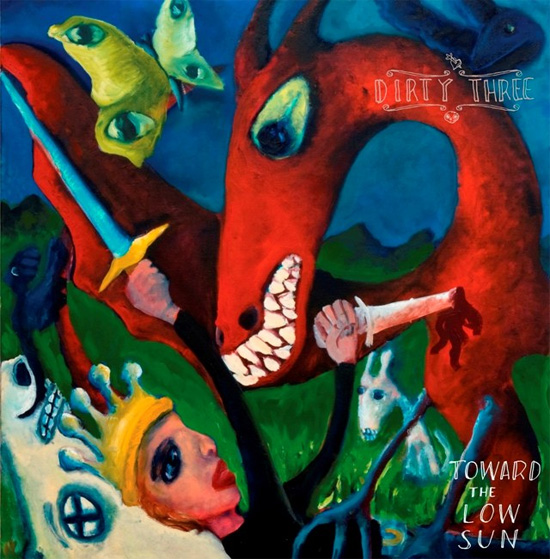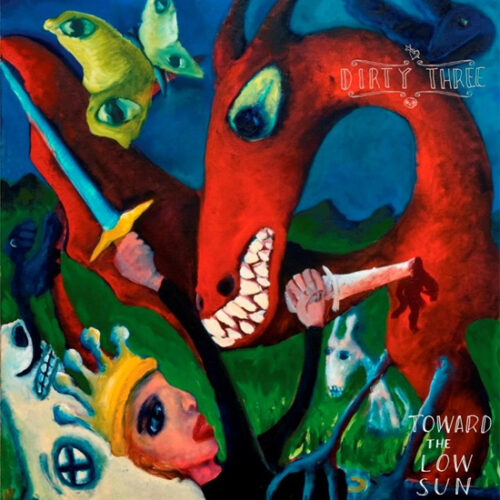Given that Toward The Low Sun is the Dirty Three’s first record in seven years, and that it marks a return to the studio after several fallow years for composition and recording, it’s been viewed in certain quarters as some sort of comeback. The problem with that reading is that it suggests that either they’ve been through a prolonged period of no activity, or that they’ve spent some time being shadows of their former musical selves. In actual fact, as violinist/frontman-of-sorts Warren Ellis has pointed out in interviews, the Australian trio never went away.
Each member might have had their dalliances with other bands and life outside the Dirty Three, but they’ve been performing live throughout the years since 2004’s Cinder. And not merely ‘performing live’ as going through the motions; on a good night – hell, on any night – they’re up there with the finest live acts in the world. Something happens between Ellis, Mick Turner and Jim White when they’re onstage that has yet to be replicated on any of their studio records. It might have something to do with volume, it might have something to do with the adoring crowds they gather – it’s likely got a lot to do with Ellis’ razor sharp between song monologues and mid-song high-kicks. Either way, they’ve remained in inspiringly raw and ragged live shape throughout the last seven years.
So the question, then, is how can the Dirty Three have rediscovered their mojo, when they never lost it in the first place?
The answer lies more in their recorded history than in their ever on-point live performances. The vast difference between the two makes a strong case for taking the Dirty Three’s records as almost entirely separate entities from their onstage selves. The songs might be the same, sure, but the way they’re delivered differs vastly. Even the three records that managed to capture the trio’s exploratory, lyrical musings in full flow – Horse Stories, Ocean Songs and Whatever You Love, You Are – only managed to do so for fleeting moments, short periods of clarity where everything gelled together with the same energy as it did while watching the three physically play together. However, they didn’t suffer for that, per se – they simply felt like different forms of the Dirty Three’s music. On record: refined, thoughtful, sombre. Live: roughly etched, harsher, more demonstrative.
Toward The Low Sun‘s opener ‘Furnace Skies’ is one of the few recorded tracks of theirs to buck that trend. The best thing they’ve committed to tape for over a decade, it begins with the distorted screech of Turner’s guitar, like someone’s pushed the record button mid-way through a jam session. Its strength lies in its relegating Ellis to a background role – instead of allowing his fiddle to take centre stage, he’s instead used to add melodic embellishment to a sun-scorched cascade of guitar notes and tumbling percussion. The result is more furiously rock-ish than anything they’ve done for quite some time, and is a reminder of the stride the trio can hit when at peak live intensity. The whole thing doesn’t travel anywhere exactly, instead remaining in a stormy state of stasis for its entire length – it simply reanimates the three players’ forms with a four minute jolt of electricity, before abruptly ending.
It’s certainly a damn sight more inspiring than anything from their last two records, which really did find the trio on rather flaccid form. Both She Has No Strings Apollo and Cinder felt like the work of a band against the ropes, minus the fluidity and narrative thrust of old (the latter especially conspicuously lacked those long, lovely, miserable songs about going away for the summer, coming home and finding out that all your friends have died, or about locking yourself away in a shed with a headful of cheap psychedelics and tripping about trumpets). During the time period since Cinder there were allusions to the band struggling to write new material – even as the older stuff still sounded just as vital pouring from the stage at 2008’s Green Man festival when Ellis, half joking, asked the audience for song ideas.
"Nobody sent anything in, the lousy buggers," said Ellis to my colleague Luke Turner a few weeks ago, when asked whether crowdsourcing had paid dividends for the band. "We had to bite the bullet and do it on our own."
Do it on their own they did, so it should be no surprise that Toward The Low Sun sounds like a Dirty Three record, through and though. And as with every Dirty Three record since time immemorial, apart from its striking opener it doesn’t quite capture the feral feel of their live performances. Surprise, surprise. However, as an addition to their album canon it’s more vibrant and engaged with the world than they’ve sounded at any time since Whatever You Love, You Are (released way back in the heady days of 2000). Surprisingly for a band who’ve made a career out of staying in more or less the same (admittedly very fruity) place, there are even some hints of new ideas rooting and beginning to take shape.
Its best moments are, like the opener, when Ellis’ rough-scrawled violin figures settle comfortably into the backdrop, drawing attention to Turner and White’s always impressive guitar/percussion interplay. On ‘Sometimes I Forget You’ve Gone’, White’s rhythms are wild-eyed and scattershot, a nice contrast to Turner’s meandering figures and short piano stanzas. The maudlin – unsurprisingly enough, given the title – ‘Rain Song’ finds Ellis using his instrument as a stand-in for the human voice for a piece that’s more song than instrumental composition. During past peaks the Dirty Three’s electrified violinsong has been reminiscent of traditional Celtic folk forms, something that returns here with the scratchy lullaby ‘Moon On The Land’ and muffled closer ‘You Greet Her Ghost’.
All that having been said, there’s nothing drastically new here – would, I wonder, have anyone expected there to be? The trio’s musical evolution seems happy to drift along incrementally, near-tectonic in pace. After a couple of album-length missteps and the always-inspiring spectacle of their live show, there’s certainly an ‘if it ain’t broke’ argument raised by Toward The Low Sun‘s rejuvenating of an already well-thumbed sound. That it continues to be as effective as ever works, I think, largely in their favour, and in ours – even if there’s a fair argument to be made that it’s ‘simply’ another good record to add to their back catalogue. Either way, it’s nice to have the Dirty Three back, and sounding just like the Dirty Three again.



